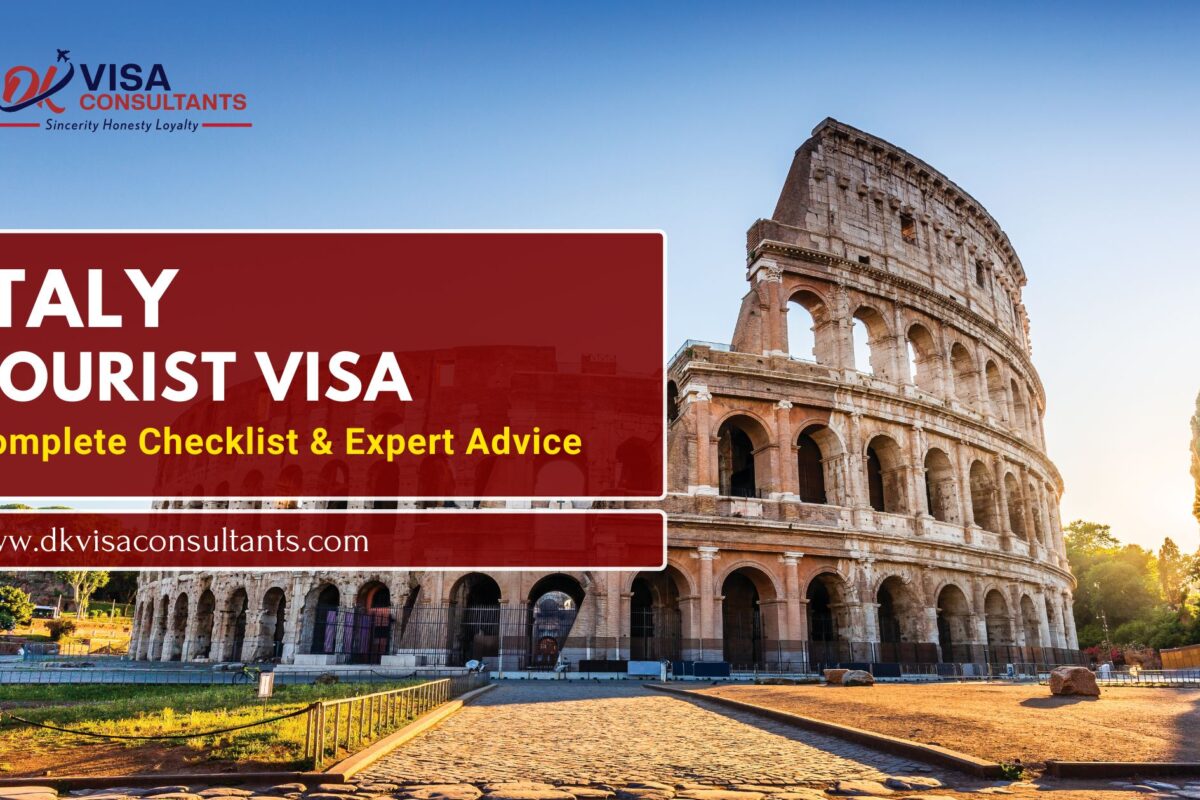Italy, with its rich history, stunning landscapes, world-class art, and mouth -watering cuisine, continues to be one of the top travel destinations for tourists worldwide. Whether individuals are planning to explore the romantic canals of Venice, the historic ruins of Rome, or the beautiful Amalfi Coast, obtaining the right Italy Tourist visa is essential to ensure a smooth trip.
As an experienced visa consultant, we understand that navigating the visa process can be daunting. That’s why we’ve crafted this comprehensive guide to help prepare for Italy tourist visa application with ease. From understanding visa types to knowing the documents required, this post will walk through every step of the process.
Types of Italy Tourist Visas
Before diving into the application process, it’s crucial to understand which type of visa you’ll need based on your travel intentions. For most tourists, the Schengen visa is the appropriate choice, as Italy is part of the Schengen Area, which allows them to travel freely between 27 European countries.
There are two main types of tourist visas for Italy:
1. Short-Stay Schengen Visa (Type C):This is the most common visa for tourists planning a visit of up to 90 days within a 180-day period. It’s ideal for those who plan to visit Italy and other Schengen countries for tourism, business, or family visits.
2. Long-Stay Visa (Type D): If candidate planning to stay longer than 90 days for studying, working, or joining family, a long-stay visa will required. However, for most tourists, this visa is unnecessary, as a short-stay visa is sufficient.
Who Needs an Italy Tourist Visa?
Tourists from non-EU/EEA countries generally need to apply for a visa to visit Italy. If candidate hold a passport from a Schengen Area country, the EU, or some other countries with visa-free access to Italy, they may not need a visa. To confirm if they need a visa, check the Italian Ministry of Foreign Affairs website or consult their nearest Italian consulate.
Key Eligibility Requirements
In addition to the specific documents required for the visa application, certain eligibility conditions must met for a tourist visa:
1. Purpose of Visit: Trip must primarily be for tourism, visiting family, or attending events. If their purpose involves work or study, the type of visa will differ.
2. Sufficient Funds: Candidate must prove that they have enough financial resources to support themselves during their stay in Italy. This includes demonstrating that they can afford accommodation, food, travel, and any unexpected expenses.
3. Return to Home Country: Individual must show evidence that they intend to return to their home country at the end of visit. This is typically done by providing proof of ties to their home country, such as employment, family, or property.
Checklist for Applying for an Italy Tourist Visa
Here’s a complete checklist of the essential documents and steps to help them to apply for an Italy tourist visa:
To ensure that applicant application is successful, it’s important to have all the required documents ready.
1.Completed Visa Application Form
The first step is filling out the Schengen visa application form. Candidates can find this form on the official website of the Italian consulate or embassy in their country. The form must filled out accurately and completely.
2. Passport-Size Photographs
Applicants will need two recent passport-size photos that meet the specifications laid out by the consulate. These typically include a neutral expression, a white background, and a clear view of your face.
3. Valid Passport
Candidate passport must be valid for at least three months beyond their intended stay in Italy. It should also have at least two blank pages for visa stamps. If they have travelled to other countries, it’s advisable to include their previous passports too.
4. Travel Itinerary
Candidate must provide a detailed travel itinerary for their trip to Italy. This should include:
- Applicant flight reservation with dates and travel details.
- Hotel reservations or other accommodation details, including addresses and confirmation numbers.
- A travel schedule that outlines the places they plan to visit and the duration of their stay in each location.
5. Travel Insurance
One of the key requirements for obtaining a Schengen visa is travel insurance. This insurance must cover the entire Schengen Area for medical emergencies, hospital stays, and repatriation in the event of an emergency. The minimum coverage should be €30,000.
6. Proof of Sufficient Funds
Applicants must prove that they have enough money to cover their own expenses during their stay in Italy. This can done through:
- Recent bank statements (typically for the last three months).
- Proof of employment or business ownership.
- Credit card statements or other financial assets.
7. Visa Fee Payment
A non-refundable visa application fee must be paid at the time of submitting individual application. As of 2025, the fee is approximately €80 for adults. Fees can vary depending on the consulate and the applicant’s nationality.
8. Cover Letter
A cover letter outlining the purpose of their trip is often required. This letter should briefly describe why they are visiting Italy, travel dates, and their intent to return to their home country after the trip.
9. Proof of Accommodation
If applicants staying in a hotel, a hotel booking confirmation is necessary. If they are staying with friends or family, they will need an invitation letter from the host, along with a copy of their passport or ID.
10. Flight Reservation
While candidate don’t need to purchase the flight tickets upfront, they must provide a flight reservation. This should include departure and return dates, and proof of entry and exit from Italy. Applicant can get a flight reservation from travel agencies or online services.
Additional Documents for Specific Cases
- For students: Proof of enrolment in an educational institution and a letter of permission from their school.
- For business travellers: An invitation letter from the business they are visiting, along with evidence of business activities.
- For minors: Additional documents like a birth certificate and consent from parents or legal guardians may required.
Steps to Apply for an Italy Tourist Visa
Once individual have all the required documents, here’s what to do next:
1. Book an Appointment: Visit the official website of the Italian consulate or embassy in their country to book an appointment for submitting their visa application.
2. Attend the Interview: On the day of appointment, go to the visa application centre to submit their application and documents. Be prepared for a short interview where they may be asked about candidate travel plans.
3. Pay the Visa Fee: Pay the visa application fee at the time of their appointment.
4. Wait for the Decision: The processing time for an Italy tourist visa can take anywhere from 7 to 15 days. If applicant application is approved, their visa will be stamped in their passport.
Also Read: Best Universities, Courses to Study in Italy
Expert Advice for a Smooth Visa Application Process
1. Plan Ahead: Apply for a visa at least 3-6 weeks before candidate intended travel date to allow enough time for processing.
2. Check Consulate Requirements: Each Italian consulate may have slightly different documentation requirements, so always double-check the specific requirements for their specific location.
3. Accuracy is Key: Ensure that all the information applicant provide is accurate and consistent. Incorrect details can lead to delays or rejections.
4. Consult an Expert: If candidate unsure about any part of the visa process, consider working with a visa consultant like DK Visa Consultant, who can guide them through each step with expertise.
Conclusion
Obtaining an Italy tourist visa doesn’t have to be a complicated process if follow the right steps and gather the necessary documentation. By using this checklist and expert advice, you’ll be better prepared to submit a strong application and start dream trip to Italy with confidence.
Whether you’re planning a short getaway or an extended stay, the key is to plan ahead, stay organized, and ensure that all required documents are in order. At DK Visa Consultant, we specialize in making the visa process as smooth and efficient as possible. If you need any assistance with your application, don’t hesitate to reach out to our team for expert guidance.
FAQ
Q1: How long can I stay in Italy with a Schengen visa?
Ans: A Schengen visa allows you to stay for up to 90 days within a 180-day period in Italy and other Schengen countries.
Q2: How soon should I apply for my Italy tourist visa?
Ans: It’s recommended to apply for your visa at least 3-6 weeks before your intended travel date to ensure enough processing time.
Q3: What happens if my Italy tourist visa is rejected?
Ans: If your visa application is rejected, you will be given a reason for the refusal. You can appeal the decision or reapply with additional supporting documents.
Q4: Do I need to book my flight and accommodation before applying for a visa?
Ans: While you don’t need to purchase your flight and accommodation upfront, you must provide flight reservations and hotel bookings or an invitation letter from your host.
Q5: Can I apply for an Italy visa through a third party or agency?
Ans: Yes, you can apply through a visa agency or consultant like DK Visa Consultant, which can assist with document preparation and ensure the application is correctly submitted.


